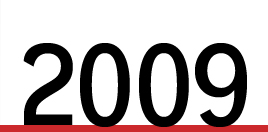Workshop Speakers
Click to learn about each NASW Annual Workshop Speaker
Science journalist
Science writer
Director of Research Communications, Duke University
U.S. editor, International Science Grid This Week
Freelance
Freelance
Owner, ScienceSites Communication
Reporter, KUT-FM
Communications director, The University of Texas at Austin College of Natural Sciences
Freelance video science reporter
West Coast correspondent, Nature
Director of Multimedia, Time.com
Freelance
Vice president, The Horn Group, San Francisco
Freelance science & environmental journalist
Podcaster and journalist, Science magazine and freelance
Freelance
Director, Knight Center for Digital Media Entrepreneurship at Arizona State University
Executive editor, Online, Kaiser Health News
Editor-in-chief symmetry magazine; deputy communications director, SLAC National Accelerator Laboratory
Author, Internet Law: A Field Guide and attorney, Dow Lohnes PLLC
Senior editor, LiveScience.com/SPACE.com
Staff writer, Wired.com; visiting scholar, UC Berkeley Office for the History of Science and Technology
Earth’s premier science comedian
Contributing writer, The New York Times Magazine
Freelance
Freelance writer and editor of the online e-zine GoExploreMichigan.com
Deputy editor, Science and Health, Los Angeles Times
Writer, producer, and webhost, The Exploratorium
Freelance
Senior communications consultant, Mayo Clinic
Freelance/contributing editor, Scientific American
Freelance writer and video producer, http://johnpavlus.com, http://www.smallmammal.com
Computer-Assisted-Reporting specialist, Center for Public Integrity
Senior new media editor, Princeton University
Senior editor, Wired
Freelance writer, president, Council for the Advancement of Science Writing
Editor, The Root
Senior editor, Texas Monthly
Contributing editor, U.S. News & World Report
Freelance
Staff writer, The Texas Observer
President, Charity Dynamics
Science writer and editor
Lecturer, University of Texas-Austin
Jill U. Adams
Marc Airhart
Marc Airhart is a science writer for the University of Texas at Austin's Jackson School of Geosciences. He covers research and education across the earth sciences, including geology, geophysics, natural hazards, energy and climate change. He also does free-lance writing about science, nature, society and the environment for print, radio and online outlets. From 1995 to 2006, he was a writer and producer for the daily science radio program Earth & Sky. He has also contributed to national publications and programs including Scientific American, Mercury, StarDate Magazine and Pulse of the Planet. http://www.nj.com/morristown/
Karl Leif Bates
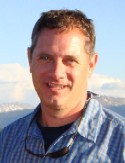 Karl Leif Bates, Director of Research Communications, Duke University. A 15-year veteran of newspaper journalism and former winner of the AAAS science writing award, Karl edits and writes research news from all units of Duke and runs a monthly online magazine featuring multimedia storytelling (http://research.duke.edu). Karl serves on the advisory boards of EurekAlert! and the Science and Medical Journalism Program at the University of North Carolina, and is a founding member of the Science Communicators of North Carolina (SCONC).
Karl Leif Bates, Director of Research Communications, Duke University. A 15-year veteran of newspaper journalism and former winner of the AAAS science writing award, Karl edits and writes research news from all units of Duke and runs a monthly online magazine featuring multimedia storytelling (http://research.duke.edu). Karl serves on the advisory boards of EurekAlert! and the Science and Medical Journalism Program at the University of North Carolina, and is a founding member of the Science Communicators of North Carolina (SCONC). Karl is a panelist and organizer for session B3: Visual Journalism for Science Writers
Alan Brown
Nearly 30 years ago, Alan Brown’s boss called him into his office and fired him because “nobody here likes you.” Surprisingly, only a few weeks later, this very same boss hired him as a consultant (as long as he didn't visit the office or talk to other employees). That was the start of a lucrative freelance career. Alan has been an editor, contract editor, and freelance writer for a variety of publications and Websites, some of which you may have even heard. Several years ago, he accepted (after many years of lobbying for it) a part-time associate editor position at Mechanical Engineering, which provides benefits (yes!) and allows him to work at home, write fun features, and continue to freelance.
A 30-year career in freelancing does not happen by accident, though this one involved quite a number of false starts, flubs, and failures. A successful freelance career takes planning. His presentation focus on how writers can use goals and plans to take control of their careers, write the stories they want to write, and even make a good living at it. You can reach Alan Brown with questions, comments, and lucrative proposals at insight01@verizon.net.
Alan is a panelist for session C2: You are Not Just Writing – You are in a Business Venture: Entrepreneurial Skills for Science Writers
Merry Bruns
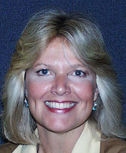 Merry Bruns is a nationally recognized content strategist and leading Web Writing trainer who focuses on customer-centered content, and strategic web writing and editing skills. Merry has taught her internationally recognized "Writing and Editing for the Web" classes to hundreds of students worldwide since 1997. She holds open classes at the National Press Club in Washington DC, and provides in-house training to organizations and businesses, customized around their content and goals.
Merry Bruns is a nationally recognized content strategist and leading Web Writing trainer who focuses on customer-centered content, and strategic web writing and editing skills. Merry has taught her internationally recognized "Writing and Editing for the Web" classes to hundreds of students worldwide since 1997. She holds open classes at the National Press Club in Washington DC, and provides in-house training to organizations and businesses, customized around their content and goals. Producing and editing web sites since 1994, she brings a background in communications, media and journalism to her work. As principal of ScienceSites Communications (http://www.sciencesitescom.com), she has produced, and edited sites for numerous business, government, educational, and science organization clients. Her clients for content strategy and training have included Accenture, National Academy of Sciences, BBC London, Porter-Novelli, Centers for Disease Control (CDC), Towers-Perrin, Westat, First Coast Service Options, American Chemical Society, the World Bank, NASA/Goddard Space Flight Center, Georgetown University, American Petroleum Institute, Textron, EPA, Jackson Laboratories, Seton Hall University, Harvard Medical School, and many more.
She's frequently published and often interviewed about content strategy and web writing issues, and has been an invited speaker and trainer at web conferences, meetings and events nationwide.
Originally from New York City, she now lives in Washington DC.
Merry is a panelist and organizer for session C4: Web Writing and Search Engine Optimization: If You've Got It, Flaunt It!
Kevin Coughlin
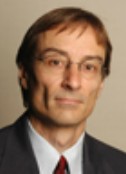 Kevin Coughlin covered technology for The Star-Ledger from 1995 to 2007. In December 2007, Coughlin helped launch the newspaper's first hyperlocal website, MorristownGreen.com. As editor of MG, he blogs, shoots photos and videos, records podcasts, recruits talent and organizes film festivals and other promotional events. He is a graduate of Rutgers University and a former Knight Science Journalism Fellow at M.I.T. http://www.nj.com/morristown/
Kevin Coughlin covered technology for The Star-Ledger from 1995 to 2007. In December 2007, Coughlin helped launch the newspaper's first hyperlocal website, MorristownGreen.com. As editor of MG, he blogs, shoots photos and videos, records podcasts, recruits talent and organizes film festivals and other promotional events. He is a graduate of Rutgers University and a former Knight Science Journalism Fellow at M.I.T. http://www.nj.com/morristown/
Rex Dalton
Rex Dalton's interest in scientific misconduct has earned him he unofficial title of Crime Correspondent at Nature. Since 1999, he has been the journal's west coast correspondent, covering topics including paleontology, anthropology, and the Earth sciences. Over the course of a 25-year career, Dalton has reported extensively on local US politics and covered medicine for the San Diego Union-Tribune.
Rex is a panelist for session A1: Investigative Science Journalism
Craig Duff
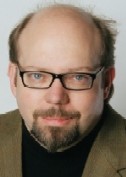 Craig Duff is an award-winning broadcast journalist and documentary television director, producer and writer. He is currently the director of multimedia for TIME.com, where he oversees video and podcasts, trains reporters in the use of video, and produces his own work as the magazine expands its online offerings. In spring 2008, Craig was a Ferris Professor of Journalism in residence at Princeton University, where he taught a seminar on multi-platform journalism. He spent the previous year in Egypt, where served as a Knight International Journalism Fellow at the Center for Electronic Journalism at the American University in Cairo. Prior to the fellowship and during his academic appointments, Craig worked with the The New York Times as the paper ventures into broadcast journalism through the expanded use of video on its website. http://craigduff.wordpress.com/about/
Craig Duff is an award-winning broadcast journalist and documentary television director, producer and writer. He is currently the director of multimedia for TIME.com, where he oversees video and podcasts, trains reporters in the use of video, and produces his own work as the magazine expands its online offerings. In spring 2008, Craig was a Ferris Professor of Journalism in residence at Princeton University, where he taught a seminar on multi-platform journalism. He spent the previous year in Egypt, where served as a Knight International Journalism Fellow at the Center for Electronic Journalism at the American University in Cairo. Prior to the fellowship and during his academic appointments, Craig worked with the The New York Times as the paper ventures into broadcast journalism through the expanded use of video on its website. http://craigduff.wordpress.com/about/
Susan Etlinger
Susan Etlinger, Vice President, The Horn Group, San Francisco. Susan is an accomplished communication professional with particular expertise in technology and social media. She has worked with companies across a range of industries and is known for her ability to develop strategic, high-impact programs and translate complex material into clear, accessible language.
Susan is regularly interviewed and asked to speak on social media trends. During the past year, she has presented at the Consumer Electronics Show and at the Association for Consumer Trends forum. She has been quoted in the New York Times, the San Jose Mercury News, eContent Magazine, PRSA Tactics, and 1-to-1 Magazine, among others.
Susan is a passionate blogger. Her personal blog, The Family Room, has been profiled on Megan Morrone and Leo Laporte's Jumping Monkeys podcast, in 7X7 Magazine and on Strollerderby. Susan has also contributed to BabyCenter’s MOMformation and the Silicon Valley Moms blog, where she has written on behavior and development from the parent’s perspective. She was a judge of the 2008 BlogHer Heroes Award sponsored by Wiley Publishing and was a panelist and moderator at BlogHer 2008.
Before joining Horn Group, Susan held senior corporate and agency positions. She is a published translator and has a B.A in Rhetoric from the University of California at Berkeley.
Susan is a presenter for the All-day Multimedia Workshop: Succeeding in the Web 2.0 World
Douglas Fox
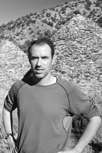 Douglas Fox is a freelance science writer based in northern California. Before becoming a writer, he earned a B.S. in biochemistry at Brown University. He writes broadly on conservation, climate change, neuroscience, and the origin of life on Earth. Doug’s work has appeared in Discover, New Scientist, Scientific American, US News & World Report, Science, Conservation, Popular Mechanics, Science News for Kids, Natural History, The Christian Science Monitor, and the LA Times. In 2007, Doug spent seven weeks traveling with a deep-field expedition to the West Antarctic Ice Sheet, while researching a series of stories on the effects of climate change. Doug’s story, “Did life begin in ice?” (Discover, Feb 2008) was published in The Best American Science and Nature Writing 2009. His story, “The private life of the brain” (New Scientist, 8 Nov 2008) garnered an honorable mention for the 2009 ASJA Outstanding Medical Writing category.
Douglas Fox is a freelance science writer based in northern California. Before becoming a writer, he earned a B.S. in biochemistry at Brown University. He writes broadly on conservation, climate change, neuroscience, and the origin of life on Earth. Doug’s work has appeared in Discover, New Scientist, Scientific American, US News & World Report, Science, Conservation, Popular Mechanics, Science News for Kids, Natural History, The Christian Science Monitor, and the LA Times. In 2007, Doug spent seven weeks traveling with a deep-field expedition to the West Antarctic Ice Sheet, while researching a series of stories on the effects of climate change. Doug’s story, “Did life begin in ice?” (Discover, Feb 2008) was published in The Best American Science and Nature Writing 2009. His story, “The private life of the brain” (New Scientist, 8 Nov 2008) garnered an honorable mention for the 2009 ASJA Outstanding Medical Writing category. Douglas is a panelist for session B4: The Art of the Interview – Extreme Edition
Robert Frederick
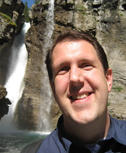 Robert Frederick is the online multimedia editor for Science where he runs the magazine's podcast and creates videos and other online multimedia projects. Prior to that, he freelanced for a number of NPR member stations, NPR national, and print outlets. He caught the radio bug through the AAAS Mass Media Science and Engineering Fellowship, which placed him at KUNC-FM in Greeley, Colorado. The fellowship came during graduate school at the University of Michigan, where he earned a master's degree in applied mathematics. Then, after four years of freelancing, he suddenly won a couple of awards at the very moment Science was looking for a new podcaster, luckily got noticed, and got the job. Prior to graduate school and discovering that science journalists were his tribe, he tried careers in management consulting, math textbook editing, high school teaching, and professional singing.
Robert Frederick is the online multimedia editor for Science where he runs the magazine's podcast and creates videos and other online multimedia projects. Prior to that, he freelanced for a number of NPR member stations, NPR national, and print outlets. He caught the radio bug through the AAAS Mass Media Science and Engineering Fellowship, which placed him at KUNC-FM in Greeley, Colorado. The fellowship came during graduate school at the University of Michigan, where he earned a master's degree in applied mathematics. Then, after four years of freelancing, he suddenly won a couple of awards at the very moment Science was looking for a new podcaster, luckily got noticed, and got the job. Prior to graduate school and discovering that science journalists were his tribe, he tried careers in management consulting, math textbook editing, high school teaching, and professional singing. Robert is a panelist for session B4: The Art of the Interview – Extreme Edition
Emily Gertz
Emily Gertz is a freelance journalist covering the environment, science and technology for outlets including Grist, Dwell magazine, Popular Mechanics online, and Scientific American online. She is currently the editor and lead blogger of the "Stop Global Warming" blog at Change.org. Gertz was among the founding bloggers of Worldchanging.com, the award-winning web site reporting on ideas, tools and other signs of progress toward a sustainable world, as well as the site's interim managing editor during the latter half of 2007. She contributed several sections to the book Worldchanging: A User's Guide for the 21st Century.
Gertz has over a decade in online user experience, content strategy and social media. She was a producer for more than two years with IGC.org, founder of five news and information networks devoted to the environment, women's rights, labor, and other issues. In the late 1990s, she was the producer for environmental and outdoors news for OregonLive.com, the web site of The Oregonian newspaper. She has consulted with diverse clients including non-profits, financial institutions and consumer products companies, and has often worked as a web producer and site manager.
Emily is a panelist for session C2: You are Not Just Writing – You are in a Business Venture: Entrepreneurial Skills for Science Writers
David Harris
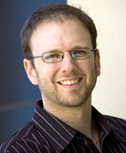 David Harris is founding editor-in-chief of the award-winning symmetry magazine and deputy communications director of SLAC National Accelerator Laboratory. He trained as a theoretical physicist before going over to the dark side or seeing the light (depending on who you ask) and becoming a full-time science journalist and communicator. He presented a weekly science program on ABC Radio (Australia) for five years, wrote and produced 65 episodes of science television for children, and has written news and features for a range of daily newspapers and magazines, including Nature, New Scientist, Wired, and many others. He serves on the board of the American Physical Society's Forum on Physics and Society, and was previously the APS Head of Media Relations. He is currently building a new science publication for launch in 2010.
David Harris is founding editor-in-chief of the award-winning symmetry magazine and deputy communications director of SLAC National Accelerator Laboratory. He trained as a theoretical physicist before going over to the dark side or seeing the light (depending on who you ask) and becoming a full-time science journalist and communicator. He presented a weekly science program on ABC Radio (Australia) for five years, wrote and produced 65 episodes of science television for children, and has written news and features for a range of daily newspapers and magazines, including Nature, New Scientist, Wired, and many others. He serves on the board of the American Physical Society's Forum on Physics and Society, and was previously the APS Head of Media Relations. He is currently building a new science publication for launch in 2010. David is a panelist for session C3: The Secret Life of Social Media: New Rules for Science Writers
Jonathan Hart
Jonathan Hart specializes in the representation of media and technology companies on a broad range of commercial, transactional, operational and content matters; he has been representing businesses that gather and distribute news and information, sell advertising, market goods and services, and build community on the Internet for as long as there has been a commercial Internet. His clients include dozens of websites, newspapers, magazines, radio and television stations, and technology and telecommunications companies.
Jon has been on the faculty of the Stanford Professional Publishing Courses since 1994. He is counsel to the Online News Association, and writes and speaks frequently on media and technology law. Jon is a contributor to the International Libel & Privacy Handbook (Bloomberg 2006). The sixth edition of his book, Internet Law: A Field Guide, was released by BNA Books in November 2008. Before entering private practice, Jon clerked for United States Circuit Judge Jerome Farris and United States District Judge Almeric Christian. He is a graduate of Middlebury College and Stanford Law School.
Jonathan is a panelist for session A4: Mini-Law School for Science Writers
Robin Lloyd
Robin is a panelist and organizer for both session B2: Social Media for Beginners – How, Where & Why to Dive In and session C3: The Secret Life of Social Media: New Rules for Science Writers
Alexis Madrigal
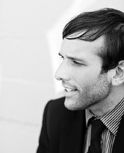 Alexis Madrigal is a leading science and energy writer. Since joining Wired.com in 2007, he has helped build Wired Science into the most popular science blog in the world, with millions of visitors per month. Wired Science won the 2009 People's Voice Webby Award for best science website and was nominated for best magazine blog by the MPA. Madrigal is a visiting scholar at UC-Berkeley’s Office for the History of Science and Technology, where he works on his forthcoming book about the history of green technology. He’s been invited to speak at South by Southwest, Berkeley Journalism School, Stanford Law School, E3, and Webvisions, and is a regular guest on NPR.
Alexis Madrigal is a leading science and energy writer. Since joining Wired.com in 2007, he has helped build Wired Science into the most popular science blog in the world, with millions of visitors per month. Wired Science won the 2009 People's Voice Webby Award for best science website and was nominated for best magazine blog by the MPA. Madrigal is a visiting scholar at UC-Berkeley’s Office for the History of Science and Technology, where he works on his forthcoming book about the history of green technology. He’s been invited to speak at South by Southwest, Berkeley Journalism School, Stanford Law School, E3, and Webvisions, and is a regular guest on NPR. Alexis is a panelist for session C3: The Secret Life of Social Media: New Rules for Science Writers
Brian Malow
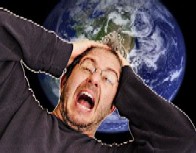 Brian Malow began his stand up career in Austin, Texas, while working toward a Masters in Television Production. A 10-year veteran of the comedy club circuit, he has performed in nearly 40 states (and has shown no interest in the others). A life-long fan of science and science fiction, Brian has developed a brand of intelligent, imaginative comedy that takes delight in playful use of language, and is shot-through with a healthy dose of science references. His clean, energetic style has also made him a favorite at colleges and for corporate clients such as Dell, Apple, Honeywell, Texaco and 3M. His first foray into independent feature filmmaking (as producer and co-star) resulted in a premiere at the 1999 Sundance Film Festival, where he did not meet Robert Redford. Los Enchiladas!, directed by fellow comic Mitch Hedberg, is currently not available in any format. For the past four years, Brian has enjoyed living in San Francisco, where he has embarked on a new venture as producer and host of a live internet talk show, while continuing to perform at Bay Area comedy clubs and for corporate clients. http://www.butseriously.com/
Brian Malow began his stand up career in Austin, Texas, while working toward a Masters in Television Production. A 10-year veteran of the comedy club circuit, he has performed in nearly 40 states (and has shown no interest in the others). A life-long fan of science and science fiction, Brian has developed a brand of intelligent, imaginative comedy that takes delight in playful use of language, and is shot-through with a healthy dose of science references. His clean, energetic style has also made him a favorite at colleges and for corporate clients such as Dell, Apple, Honeywell, Texaco and 3M. His first foray into independent feature filmmaking (as producer and co-star) resulted in a premiere at the 1999 Sundance Film Festival, where he did not meet Robert Redford. Los Enchiladas!, directed by fellow comic Mitch Hedberg, is currently not available in any format. For the past four years, Brian has enjoyed living in San Francisco, where he has embarked on a new venture as producer and host of a live internet talk show, while continuing to perform at Bay Area comedy clubs and for corporate clients. http://www.butseriously.com/
Robin Marantz Henig
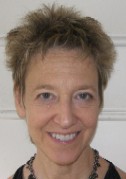 Robin Marantz Henig has written eight books, most recently Pandora’s Baby: How the First Test Tube Babies Sparked the Reproductive Revolution. She is a contributing writer for The New York Times Magazine, and her articles about health and medicine have also appeared in Civilization, Discover, Scientific American, and just about every woman’s magazine in the grocery store. Since 1998 she has been on the board of directors of the National Association of Science Writers. Robin has received an Alicia Patterson Foundation fellowship and a Sloan Foundation grant; was a finalist for a National Book Critics Circle Award for The Monk in the Garden: The Lost and Found Genius of Gregor Mendel; and is a recipient this year of a Guggenheim Foundation fellowship. She went to Cornell and has a master’s in journalism from Northwestern. Robin lives in New York City with her husband Jeff, who teaches at Columbia, and both of their grown daughters who are, oddly enough, journalists.
Robin Marantz Henig has written eight books, most recently Pandora’s Baby: How the First Test Tube Babies Sparked the Reproductive Revolution. She is a contributing writer for The New York Times Magazine, and her articles about health and medicine have also appeared in Civilization, Discover, Scientific American, and just about every woman’s magazine in the grocery store. Since 1998 she has been on the board of directors of the National Association of Science Writers. Robin has received an Alicia Patterson Foundation fellowship and a Sloan Foundation grant; was a finalist for a National Book Critics Circle Award for The Monk in the Garden: The Lost and Found Genius of Gregor Mendel; and is a recipient this year of a Guggenheim Foundation fellowship. She went to Cornell and has a master’s in journalism from Northwestern. Robin lives in New York City with her husband Jeff, who teaches at Columbia, and both of their grown daughters who are, oddly enough, journalists.
Maryn McKenna
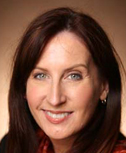 Maryn McKenna has been a freelance science/medical writer since 2006, writing for SELF, Health, More and other magazines. She is also a contributing writer for the online news service CIDRAP and for the Annals of Emergency Medicine. In 2006-2007, she was a Kaiser Family Foundation media fellow, studying emergency department overcrowding and stress. Prior to 2006, she covered the Centers for Disease Control for the Atlanta Journal-Constitution, and before that was a projects reporter for the Boston Herald and the Cincinnati Enquirer. She was the Knight Fellow in Medicine in the University of Michigan's Knight-Wallace Fellows program in 1998-99, and has also held short fellowships at the University of Maryland and Harvard Medical School. She is the author of Beating Back the Devil: On the Front Lines with the Disease Detectives of the Epidemic Intelligence Service (Free Press/Simon & Schuster, 2004) and the forthcoming Superbug: The Rise of Drug-Resistant Staph and the Danger of a World Without Antibiotics (Free Press/Simon & Schuster, 2010) and blogs at http://drugresistantstaph.blogspot.com.
Maryn McKenna has been a freelance science/medical writer since 2006, writing for SELF, Health, More and other magazines. She is also a contributing writer for the online news service CIDRAP and for the Annals of Emergency Medicine. In 2006-2007, she was a Kaiser Family Foundation media fellow, studying emergency department overcrowding and stress. Prior to 2006, she covered the Centers for Disease Control for the Atlanta Journal-Constitution, and before that was a projects reporter for the Boston Herald and the Cincinnati Enquirer. She was the Knight Fellow in Medicine in the University of Michigan's Knight-Wallace Fellows program in 1998-99, and has also held short fellowships at the University of Maryland and Harvard Medical School. She is the author of Beating Back the Devil: On the Front Lines with the Disease Detectives of the Epidemic Intelligence Service (Free Press/Simon & Schuster, 2004) and the forthcoming Superbug: The Rise of Drug-Resistant Staph and the Danger of a World Without Antibiotics (Free Press/Simon & Schuster, 2010) and blogs at http://drugresistantstaph.blogspot.com. Maryn is a panelist for session C2: You are Not Just Writing – You are in a Business Venture: Entrepreneurial Skills for Science Writers
Rosie Mestel
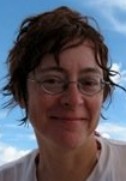 Rosie Mestel, Deputy Editor, Science and Health, Los Angeles Times Rosie Mestel is deputy editor of science and health at the Los Angeles Times. Originally from England, she came to the United States to work for a PhD. in genetics. But after earning her degree and working as a post-doc in a fruit-fly lab, she decided to switch to science writing. After completing the science-writing program at the University of California, Santa Cruz in 1991, she interned at the Dallas Morning News and then worked as a reporter for Discover magazine. She then embarked on a semi-freelancing career -- working as a West Coast correspondent for New Scientist and a contributing editor for Health magazine, while writing articles for Science, Natural History and Discover. She became a staff writer at the LA Times in 1998.
Rosie Mestel, Deputy Editor, Science and Health, Los Angeles Times Rosie Mestel is deputy editor of science and health at the Los Angeles Times. Originally from England, she came to the United States to work for a PhD. in genetics. But after earning her degree and working as a post-doc in a fruit-fly lab, she decided to switch to science writing. After completing the science-writing program at the University of California, Santa Cruz in 1991, she interned at the Dallas Morning News and then worked as a reporter for Discover magazine. She then embarked on a semi-freelancing career -- working as a West Coast correspondent for New Scientist and a contributing editor for Health magazine, while writing articles for Science, Natural History and Discover. She became a staff writer at the LA Times in 1998.
Mary Miller
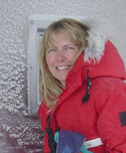 Mary Miller is a science writer and web producer for the Exploratorium. She also co-teaches a web media course at the UC Santa Cruz Science Communication Program and is a freelance contributor to Smithsonian, Natural History, New Scientist, and Discovery Online. For the last two years, she has led an Exploratorium web production team exploring science in the Arctic and Antarctic. This work took her to Greenland and Antarctica in 2008 where she produced live webcasts, video interviews, and blog posts for the Exploratorium's Ice Stories Website: icestories.exploratorium.edu.
Mary Miller is a science writer and web producer for the Exploratorium. She also co-teaches a web media course at the UC Santa Cruz Science Communication Program and is a freelance contributor to Smithsonian, Natural History, New Scientist, and Discovery Online. For the last two years, she has led an Exploratorium web production team exploring science in the Arctic and Antarctic. This work took her to Greenland and Antarctica in 2008 where she produced live webcasts, video interviews, and blog posts for the Exploratorium's Ice Stories Website: icestories.exploratorium.edu. Mary is a panelist for session B4: The Art of the Interview – Extreme Edition
Steve Miller
After working as a chemist and marketing specialist for more than 20 years, Steve Miller decided that writing from home in his robe made more sense than driving to work every morning. He specializes in being a generalist, having written numerous articles about physical sciences, materials science, energy and environment for trade magazines and journals and for magazines for children and young adults. For several years, he wrote for and edited a newsletter for the Superconductor industry. Much of his current work involves K-12 science and math curriculum materials, including textbooks, assessment materials, teacher’s guides, and lots of multiple-choice questions. In the freelancer’s constant quest for the next assignment, he has also taken on writing press releases for the Penn State College of Science and editing grant proposals and journal submissions for the university’s Materials Science Institute. Steve is the coauthor of a book on High-Performance manufacturing and author of The Complete Idiot's Guide to the Science of Everything.
Steve is the moderator and organizer for C2: You are Not Just Writing – You are in a Business Venture: Entrepreneurial Skills for Science Writers
Christie Nicholson
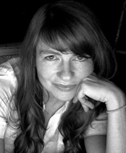 Christie Nicholson is freelance science journalist in New York. A graduate of Columbia University's School of Journalism, she co-created the "Science of Sex" which won two Webbys. As special projects editor at Scientific American, she developed an online community, and helped launch two video series and two audio podcasts. She hosts and produces the weekly audio podcast 60-Second Psych, and is an on-air contributor to the Web and TV shows Grand Unified Weekly and Brink. Currently a contributing editor at Scientific American, she teaches multimedia and Web journalism each summer at the Banff Centre for the Arts.
Christie Nicholson is freelance science journalist in New York. A graduate of Columbia University's School of Journalism, she co-created the "Science of Sex" which won two Webbys. As special projects editor at Scientific American, she developed an online community, and helped launch two video series and two audio podcasts. She hosts and produces the weekly audio podcast 60-Second Psych, and is an on-air contributor to the Web and TV shows Grand Unified Weekly and Brink. Currently a contributing editor at Scientific American, she teaches multimedia and Web journalism each summer at the Banff Centre for the Arts.
Christie is a panelist and organizer for session B2: Social Media for Beginners – How, Where & Why to Dive In
John Pavlus
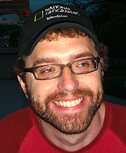 John Pavlus, freelance writer and video producer, has published in and created original video series and features for Scientific American, Popular Science, Slate.com, Nature, Wired, and The New York Times Magazine. He is the creative principal and co-founder of Small Mammal, an online video production company, and has worked as a writer and associate producer on documentaries for National Geographic Explorer, NOVA ScienceNOW, and The Science Channel.
John Pavlus, freelance writer and video producer, has published in and created original video series and features for Scientific American, Popular Science, Slate.com, Nature, Wired, and The New York Times Magazine. He is the creative principal and co-founder of Small Mammal, an online video production company, and has worked as a writer and associate producer on documentaries for National Geographic Explorer, NOVA ScienceNOW, and The Science Channel. John is a panelist for session B3: Visual Journalism for Science Writers
Michael Pell
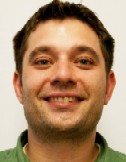 Michael Pell has been the computer assisted reporting specialist at the Center for Public Integrity in Washington, DC since December 2007. Pell’s project on pesticides, “The Perils of the New Pesticides,” won first place awards from Sigma Delta Chi and the Association of Health Care Journalists. From 2002 to 2006, as a reporter for the Watertown Daily Times in upstate New York, Pell covered local politics, the Canadian border, and environmental issues related to the Great Lakes and the St. Lawrence River. In 2007, he was a Pulliam Fellow at The Arizona Republic.
Michael Pell has been the computer assisted reporting specialist at the Center for Public Integrity in Washington, DC since December 2007. Pell’s project on pesticides, “The Perils of the New Pesticides,” won first place awards from Sigma Delta Chi and the Association of Health Care Journalists. From 2002 to 2006, as a reporter for the Watertown Daily Times in upstate New York, Pell covered local politics, the Canadian border, and environmental issues related to the Great Lakes and the St. Lawrence River. In 2007, he was a Pulliam Fellow at The Arizona Republic. Michael is a panelist for session A1: Investigative Science Journalism
Andrew Revkin
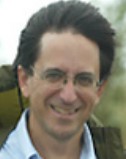 Andrew Revkin has spent nearly a quarter century covering subjects ranging from Hurricane Katrina and the Asian tsunami to the assault on the Amazon, from the troubled relationship of science and politics to climate change at the North Pole. He has been reporting on the environment for The New York Times since 1995, a job that has taken him to the Arctic three times in three years. In 2003, he became the first Times reporter to file stories and photos from the sea ice around the Pole. He spearheaded a three-part Times series and one-hour documentary in 2005 on the transforming Arctic. Before joining The Times, Mr. Revkin was a senior editor of Discover, a staff writer for the Los Angeles Times, and a senior writer at Science Digest. Mr. Revkin has a biology degree from Brown and a Master's degree in journalism from Columbia. He has taught environmental reporting as an adjunct professor at Columbia's Graduate School of Journalism. He lives in the Hudson River Valley with his wife and two sons. In spare moments, he is a performing songwriter and multi-instrumentalist who often accompanies Pete Seeger at regional shows and plays in a folk-roots band, Uncle Wade. http://topics.nytimes.com/topics/reference/timestopics/people/r/andrew_c_revkin/index.html
Andrew Revkin has spent nearly a quarter century covering subjects ranging from Hurricane Katrina and the Asian tsunami to the assault on the Amazon, from the troubled relationship of science and politics to climate change at the North Pole. He has been reporting on the environment for The New York Times since 1995, a job that has taken him to the Arctic three times in three years. In 2003, he became the first Times reporter to file stories and photos from the sea ice around the Pole. He spearheaded a three-part Times series and one-hour documentary in 2005 on the transforming Arctic. Before joining The Times, Mr. Revkin was a senior editor of Discover, a staff writer for the Los Angeles Times, and a senior writer at Science Digest. Mr. Revkin has a biology degree from Brown and a Master's degree in journalism from Columbia. He has taught environmental reporting as an adjunct professor at Columbia's Graduate School of Journalism. He lives in the Hudson River Valley with his wife and two sons. In spare moments, he is a performing songwriter and multi-instrumentalist who often accompanies Pete Seeger at regional shows and plays in a folk-roots band, Uncle Wade. http://topics.nytimes.com/topics/reference/timestopics/people/r/andrew_c_revkin/index.html
Cristine Russell
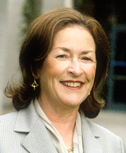 Cristine Russell has gone from hot type to Twitter in more than 35 years covering science, health, and the environment. As a contributing editor at Columbia Journalism Review magazine and at “The Observatory” online (CJR.org), she writes about the future of science journalism and the multi-media coverage of science. Russell is president of the Council for the Advancement of Science Writing and an NASW past president. She is a senior fellow at Harvard's Kennedy School of Government at the Belfer Center for Science and International Affairs and was a spring 2006 fellow at Harvard's Shorenstein Center on the Press, Politics and Public Policy. She is an award-winning former national science reporter for The Washington Post and The Washington Star. She serves on the boards of USC's Annenberg School for Communication and the Reporters Committee for Freedom of the Press and is an honorary member of Sigma Xi, the scientific research society.
Cristine Russell has gone from hot type to Twitter in more than 35 years covering science, health, and the environment. As a contributing editor at Columbia Journalism Review magazine and at “The Observatory” online (CJR.org), she writes about the future of science journalism and the multi-media coverage of science. Russell is president of the Council for the Advancement of Science Writing and an NASW past president. She is a senior fellow at Harvard's Kennedy School of Government at the Belfer Center for Science and International Affairs and was a spring 2006 fellow at Harvard's Shorenstein Center on the Press, Politics and Public Policy. She is an award-winning former national science reporter for The Washington Post and The Washington Star. She serves on the boards of USC's Annenberg School for Communication and the Reporters Committee for Freedom of the Press and is an honorary member of Sigma Xi, the scientific research society. Cristine is a moderator and organizer for C3: The Secret Life of Social Media: New Rules for Science Writers
Terence Samuel
Terence Samuel, Deputy Editor of TheRoot.com, a daily online magazine for African-Americans published by the Washington Post; former senior editor at U.S. News and World Report and national correspondent for the Philadelphia Inquirer.
Terence is a panelist for session B1: Pitching Science to Non-Science Magazines
Jake Silverstein
Jake Silverstein was born in 1975. He received a B.A. in English from Wesleyan University, an M.A. in English from Hollins University in Virginia, and an M.F.A. in Creative Writing from the Michener Center for Writers at the University of Texas at Austin. After college he was an intern at Harper’s Magazine and worked his way up, over the years, to become a Contributing Editor. He was a reporter at the Big Bend Sentinel in Marfa from 1999 to 2000 and a 2002 Fulbright Scholar in Zacatecas, Mexico. His Harper’s essay, “Highway Run,” about a Mexican road race, won the 2007 PEN/USA Journalism Award. His journalism has been featured in several anthologies, including the Best American Travel Writing 2002, and Submersion Journalism, a 2008 collection of first-person non-fiction. He came to work for Texas Monthly in 2006 as a Senior Editor. In September 2008 he was named Editor of Texas Monthly.
Jake is a panelist for session B1: Pitching Science to Non-Science Magazines
Forrest Wilder
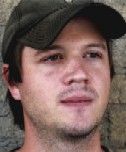 Forrest Wilder is a reporter at the Texas Observer, a biweekly political and investigative magazine based in Austin. Over the last three years, he has covered environmental issues, including a battle over coal-fired power plants and a Texas aquifer threatened by drought and overpumping. In 2007, he received a Middlebury Fellowship in Environmental Journalism to report on a radioactive waste dump in West Texas.
Forrest Wilder is a reporter at the Texas Observer, a biweekly political and investigative magazine based in Austin. Over the last three years, he has covered environmental issues, including a battle over coal-fired power plants and a Texas aquifer threatened by drought and overpumping. In 2007, he received a Middlebury Fellowship in Environmental Journalism to report on a radioactive waste dump in West Texas. Forrest is a panelist for session A1: Investigative Science Journalism
Donna Wilkins
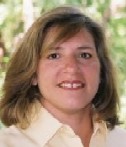 Donna Wilkins has worked with hundreds of nonprofits to implement online solutions with the ultimate goal of providing her clients the tools and confidence they need to be successful. With her experience and sharp insight, Donna has honed her ability to recognize and optimize a client’s growth opportunities to implement them as efficiently as possible. Donna has worked with hundreds of nonprofit clients, including Easter Seals, American Diabetes Association Advocacy and Special Events, the ASPCA, the Brady Campaign, and the Howard Dean Campaign. For more than two decades, Donna has been managing technical projects with a track record of delivering remarkable results on time and on budget. Donna holds an MBA from the University of Texas and a Bachelor of Science in Engineering from the University of Illinois.
Donna Wilkins has worked with hundreds of nonprofits to implement online solutions with the ultimate goal of providing her clients the tools and confidence they need to be successful. With her experience and sharp insight, Donna has honed her ability to recognize and optimize a client’s growth opportunities to implement them as efficiently as possible. Donna has worked with hundreds of nonprofit clients, including Easter Seals, American Diabetes Association Advocacy and Special Events, the ASPCA, the Brady Campaign, and the Howard Dean Campaign. For more than two decades, Donna has been managing technical projects with a track record of delivering remarkable results on time and on budget. Donna holds an MBA from the University of Texas and a Bachelor of Science in Engineering from the University of Illinois.

